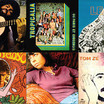Ilumencarnados seres
Três trópicos da tropicália
become a tropicalist
Tropicalismo began in me as a painful experience. The development of a social, and then political and economic, conscience, combined with existential, aesthetic, and moral concerns that questioned everything, led me to think about the songs I composed and heard. Everything that came to be called tropicalismo was nourished by acts of violence against a taste that had matured steadily and was everywhere lucidly defended. (…) I felt I lived in a homogeneous country whose inauthentic aspects – and the various versions of rock certainly represented the one of them – were a result of social injustice (which fomented ignorance) and of its macro manifestation, imperialism, which imposed its styles and products.
(…)
Imagine with which power I didn’t have to think against myself to start listening to Roberto, Beatles and Rolling Stones – and even Elis – with love.
Zé Celso liked to say that there was a strong masochist component in tropicalismo. In fact there was something of a voluptuousness respecting what previously had been considered contemptible. But I – who, as I have said, had been in the habit of strolling among piles of cans at the supermarket for the sheer aesthetic pleasure – did not surrender to that voluptuousness without first subjecting it to close examination during the waxing hours of my insomnia.
Mais:
- » become a tropicalist
- » concretes
- » glauber rocha’s new cinema
- » goals of the movement
- » modernisms of 22
- » nara’s lindonéia
- » origins
- » talking to zé celso
- » the creative energies
- » the mpb on tv
- » the name
- » the night of “alegria, alegria”
- » baby
- » black music
- » caymmi
- » janis
- » joão gilberto
- » música popular nos anos 60
- » oswald no oficina
- » stones, beatles e dylan
- » terra em transe






















